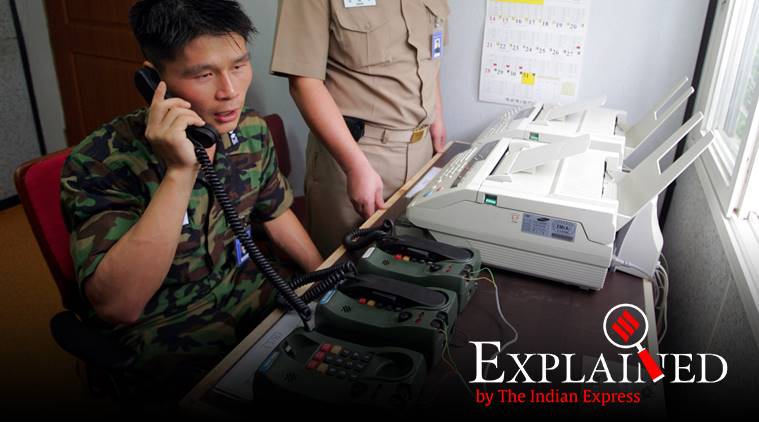Explained: Why have North Korea and South Korea stopped talking?
These inter-Korean tensions come at a time when North Korea and the US have reached an impasse on negotiations on nuclear capabilities of North Korea, discussions that had been aided by South Korea.
 South Korean Lieutenant Choi communicates with a North Korean officer at a military office near the demilitarised zone in Paju. (Reuters Photo)
South Korean Lieutenant Choi communicates with a North Korean officer at a military office near the demilitarised zone in Paju. (Reuters Photo)
This past week, Pyongyang announced it was cutting off all communication with Seoul in a tersely-worded statement, calling South Korea the “enemy” and warning that this was the first of several similar actions. According to experts, these moves may have been a result of North Korea’s frustrations at South Korea’s inability to revive, under US pressure, inter-Korean economic projects that had been beneficial to Pyongyang. Some other experts believe this break in communication may be because of anti-DPRK propaganda being launched into North Korea from activists in South Korea.
Has communication stopped between Pyongyang & Seoul before?
This is not the first time that communication between North Korea and South Korea has temporarily ceased. Despite conflict between the two countries, over the years, according to a Reuters report, at least 49 hotlines have been established between Seoul and Pyongyang to facilitate diplomatic talks, reduce tensions and military conflict, to coordinate air and sea traffic as well as to engage in cross-border economic projects etc. According to Reuters, these lines of communication were first established in the 1970s and have been updated since with modern technology.
When relations deteriorate between the two countries, these lines of communication are stopped between the two countries, till the situation improves. The lines were last cut in 2016 after diplomatic relations between Seoul and Pyongyang deteriorated, coinciding with Donald Trump becoming the US president.
 During this time, Trump sent a volley of verbal attacks North Korea’s way and Pyongyang engaged in a string of nuclear tests along with testing ballistic missiles. The lines of communication were only restored in 2018.
During this time, Trump sent a volley of verbal attacks North Korea’s way and Pyongyang engaged in a string of nuclear tests along with testing ballistic missiles. The lines of communication were only restored in 2018.
What recent incidents angered Pyongyang?
Researchers and analysts spend hours trying to understand the state of affairs in Pyongyang through dispatches in North Korean state media. Most recently, the focus of Pyongyang’s ire appears to be projects of activists and North Korean defectors in South Korea who send anti-DPRK leaflets across the border to North Korea. Along with these propaganda leaflets, other items such as rice, medicines and Bibles have also been sent across by activists using balloons.
For several days before the lines of communication were cut, Pyongyang had expressed its anger at these actions and threatened to close an inter-Korean liaison office and other inter-Korean projects if Seoul did not stop the activists and defectors.
North Korea followed on its threats by closing communication lines in its inter-Korean liaison office and the hotlines between the South Korea’s presidential office and North Korea’s leader. Communication lines between militaries of the two counties were also stopped.
Don’t miss from Explained | Asymptomatic transmission of Covid-19: why it matters, where evidence stands
South Korea’s defence ministry confirmed that daily calls had gone unanswered on North Korea’s side. On Monday, South Korea announced that for the first time in two years, North Korea did not answer the liaison office line in the morning, but an afternoon call had been answered. There was no clarity on the subject of discussion during this phone call.
 A South Korean government official communicates with a North Korean officer during a phone call on the dedicated communications hotline at the border village of Panmunjom in Paju, South Korea. (South Korea Unification Ministry/Yonhap via AP, File)
A South Korean government official communicates with a North Korean officer during a phone call on the dedicated communications hotline at the border village of Panmunjom in Paju, South Korea. (South Korea Unification Ministry/Yonhap via AP, File)
What’s next for Seoul and Pyongyang?
Long-time observers of the Korean Peninsula believe this recent development may just be about economic pressures that Pyongyang is facing, particularly at a time when the coronavirus outbreak that impacted the world economy. A dispatch in KCNA, North Korea’s state media, said the country had “been angered by the treacherous and cunning behaviour of the South Korean authorities, with whom we still have lots of accounts to settle.” KCNA went on to add: “We have reached a conclusion that there is no need to sit face to face with the South Korean authorities and there is no issue to discuss with them, as they have only aroused our dismay.”
Some researchers believe severing communication lines may have been initiated to add pressure on Seoul to revive inter-Korean economic projects that would help Pyongyang, while at the same time, force Seoul to stop activists and defectors from launching propaganda into the country. The latter has worked for now.
📣 Express Explained is now on Telegram. Click here to join our channel (@ieexplained) and stay updated with the latest
The South Korean government’s Unification ministry recently announced that it will press charges against two activists who had been sending propaganda and launching rice-filled balloons into North Korea.
South Korea’s President Moon Jae-in has been consistently working to improve relations with North Korea and some critics believe preventing activists and defectors from launching propaganda into North Korea and charging activists may be an infringement of their democratic rights and an attempt to curb their freedom of speech.
These inter-Korean tensions come at a time when North Korea and the US have reached an impasse on negotiations on nuclear capabilities of North Korea, discussions that had been aided by South Korea.
- 01
- 02
- 03
- 04
- 05






































